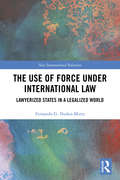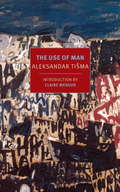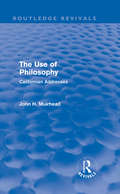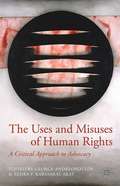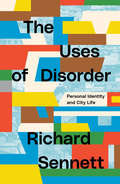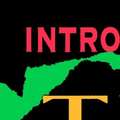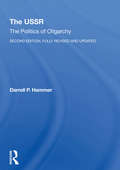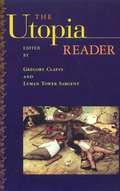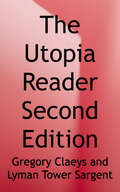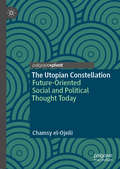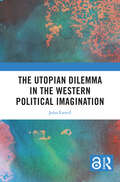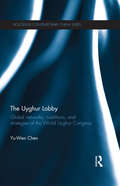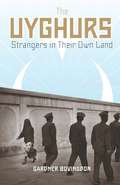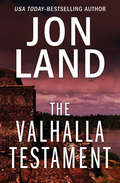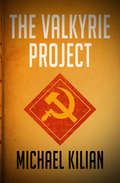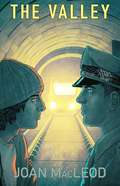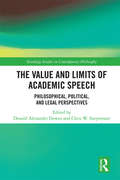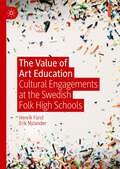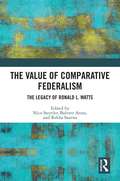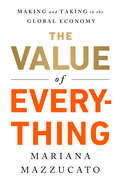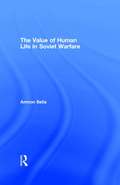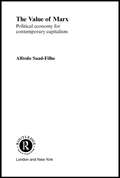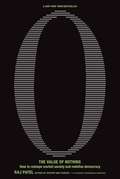- Table View
- List View
The Use of Force under International Law: Lawyerized States in a Legalized World (New International Relations)
by Fernando G. Nuñez-MietzThe international system is becoming increasingly legalized, with legal arguments and legal advisors playing an increasingly important part in the state policymaking process. Presenting a practice-oriented theory of compliance with international law, this book shows how international law affects the behavior of increasingly lawyerized states in an ever more legalized world. By highlighting the legalization of international legitimation and the lawyerization of policymaking as the new engines of compliance, the book’s analytical framework rethinks the relationship between state behavior and international law, and provides an empirical focus on security through the study of NATO’s military intervention in Yugoslavia in 1999 and the changes in the US detention and interrogation programs in the "War on Terror." Relying on primary sources, the author demonstrates the effect of lawyerized decision making on international law compliance, reconstructing the strategies of (de-)legitimation used to show that international law is the hegemonic frame of reference in interstate debates. This book will be of interest to scholars of international relations, government studies, foreign service studies and lawyers employed in government work.
The Use of Man
by Claire Messud Aleksandar Tisma Bernard JohnsonThe Use of Man starts with an unexpected discovery. World War II is ending. Sredoje Lazukić has been fighting all through it. Now, as one of the victorious Partisans, he has come home to Novi Sad. He visits the house he grew up in. Strangers nervously show him around. He looks up the mother of Milinko, his best friend. Milinko's girlfriend, Vera, was the daughter of a Jew, a bookish businessman. Her house stands empty and open. Venturing in, Sredoje is surprised to find the diary of the German tutor that Milinko, Vera, and he all shared, Fräulein, who died on the operating table just before the war. Here, however, in a cheap notebook in Vera's old room, is a record of Fräulein's lonely days, with the sentimental caption Poésie. . . .The diary survived. Sredoje survived. Vera and Milinko have survived too. But what survives? A few years back Sredoje, Vera, and Milinko were teenagers, struggling to make sense of life. Life, they now know, can be more bitter than death. A work of stark poetry and illimitable sadness, The Use of Man is one of the great books of the 20th century.
The Use of Philosophy: Californian Addresses (Routledge Revivals)
by John H MuirheadFirst published in 1928, this book reproduces the lectures and addresses that John Henry Muirhead gave on various occasions during the two and a half years he spent as Lecturer of Philosophy on the Mills Foundation at the University of California, USA. The different chapters look at the meaning and general place of Philosophy as a subject of study and the application of its leading conceptions to different areas of modern life, including science and politics. The final chapters however, present two short talks of a different nature, which were addressed to Scottish countrymen, gathered on foreign shores. This book outlines Muirhead's philosophical thoughts and conclusions to which he devoted his life.
The Uses and Limits of Small-Scale Military Interventions
by Molly Dunigan Caroline Baxter Stephen Watts Christopher RizziThe authors assess the utility and limitations of "minimalist stabilization"--small-scale interventions designed to stabilize a partner government engaged in violent conflict--and propose policy recommendations concerning when minimalist stabilization missions may be appropriate andthe strategies most likely to make such interventions successful, as well as the implications for U. S. Army force structure debates and partnership strategies.
The Uses and Misuses of Human Rights
by George Andreopoulos Zehra F. Kabasakal AratThis volume focuses on challenges to the effective and proper use of human rights and tries to identify, through a series of case studies, strategies and contexts in which human rights advocacy can work in favor of human rights, as well as situations in which such advocacy may backfire, or unintentionally cause harm.
The Uses of Disorder: Personal Identity and City Life
by Richard SennettReissue of the classic text on how cities should be plannedWhen first published in 1970, The Uses of Disorder, was a call to arms against the deadening hand of modernist urban planning upon the thriving chaotic city. Written in the aftermath of the 1968 student uprising in the US and Europe, it demands a reimagination of the city and how class, city life and identity combine. Too often, this leads to divisions, such as the middle class flight to the suburbs, leaving the inner cities in desperate straits. In response, Sennett offers an alternative image of a "dense, disorderly, overwhelming cities" that allow for change and the development of community. Fifty years later this book is as essential as it was when it first came out, and remains an inspiration to architects, planners and urban thinkers everywhere.
The Uses of Haiti
by Noam Chomsky Paul FarmerThe first part of the book could be called 'A People's History of Haiti' since it so resembles the intent and style of Howard Zinn's wonderful classic 'People's History of the United States.' The second part of the book tells personal stories that raise further debate questions about what exactly is the truth, what should US policy be towards Haiti. I found this part not quite so illuminating as the history chapters. The overall effect is part much needed alternative perspective on Haiti, and part polemic. An introduction by Howard Zinn (rest in peace) would have been so much more meaningful and hard hitting than Chomsky could ever be.
The Ussr: The Politics Of Oligarchy, Second Edition, Fully Revised And Updated (Modern Comparative Policy Ser.)
by Darrell P. HammerIn this text, Dr. Hammer presents an analytical model of the Soviet political system and its process of political decisionmaking, based on the theory of "bureaucratic pluralism." He interprets the Soviet regime as a product of three different influences: the Tsarist tradition of nondemocratic rule, the revolutionary movement that overthrew Tsarism, and the Stalinism of 1924-1953. Since the death of Stalin, the Soviet regime has slowly evolved from a personal dictatorship into an oligarchical system. According to the author, this transformation has permitted the great Soviet bureaucracies, such as the military high command and the economic managers, to increase their power and influence over policymaking and to pursue their own interests in addition to those of the regime. From this perspective, the role of party leaders in the Politburo appears to be that of political brokers among conflicting interests, allocating resources among the various bureaucracies. This second edition has been completely revised and updated to reflect the realities of the Soviet system through the 27th Party Congress, which met in February 1986. Dr. Hammer applies the model of bureaucratic pluralism in the areas of public policy and economic planning, illustrating the theme that the evolution of a powerful bureaucratic organization has prevented the achievement of the original Leninist vision. He discusses specific features of the Soviet society that deviate from original principles (often based on dissident sources from within the USSR) and examines the role of party leaders in this ideological transition. Finally, he analyzes the rise of Gorbachev to power and the first steps taken under his leadership, such as the anti-alcohol campaign and efforts at economic reform. Because Dr. Hammer's analysis is particularly valuable for understanding the Gorbachev regime and the future of the Soviet system, this text is essential reading for all students of Soviet politics.
The Utopia Reader
by Gregory Claeys Lyman Tower SargentUtopian literature has given voice to the hopes and fears of the human race from its earliest days to the present. The only single-volume anthology of its kind,The Utopia Reader encompasses the entire spectrum and history of utopian writing-from the Old Testament and Plato's Republic, to Sir Thomas More's Utopia and George Orwell's twentieth century dystopia,Nineteen Eighty-Four, through to the present day. The editors of this definitive collection demonstrate the various ways in which utopias have been used throughout history as veiled criticism of existing conditions and how peoples excluded from the dominant discourse-such as women and minorities-have used the form to imagine empowering alternatives to present circumstances. An engaging tour through the dissident, polemic, and satirical tradition of utopian writing,The Utopia Reader ultimately provides a telling portrait of civilization's persistent need to imagine and construct ideal societies.
The Utopia Reader
by Gregory Claeys Lyman Tower SargentThe book compiles primary texts from a variety of authors and movements in the history of theorizing utopias. <p><p>Utopianism is defined as the various ways of imagining, creating, or analyzing the ways and means of creating an ideal or alternative society. Prominent writers and scholars across history have long explored how or why to envision different ways of life. <p><p>The volume includes texts from classical Greek literature, the Old Testament, and Plato's Republic, to Sir Thomas More's Utopia, to George Orwell's Nineteen Eighty-Four and beyond. By balancing well-known and obscure examples, the text provides a comprehensive and definitive collection of the various ways Utopias have been conceived throughout history and how Utopian ideals have served as criticisms of existing sociocultural conditions. <p><p>This new edition includes many historically well-known works, little known but influential texts, and contemporary writings, providing an even more expansive coverage of the varieties of approaches and responses to the concept of utopia in the past, present, and even the future. <p><p>In particular, the volume now includes feminist writings and work by authors of color, and contends with current concerns, such as the exploration of the ecological ideals of Utopia. Furthermore, Claeys and Sargent highlight twenty-first century trends and popular narrative explorations of Utopias through the genres of young adult dystopias, survivalist dystopias, and non-print utopias. Covering a range of original theories of utopianism and revealing the nuances and concerns of writers across history as they attempt to envision different, ideal societies, The Utopia Reader is an essential resource for anyone who envisions a better future.
The Utopian Constellation: Future-Oriented Social and Political Thought Today
by Chamsy el-OjeiliThis book examines the utopian dimension of contemporary social and political thought. Arguing for a utopian optic for the human sciences, el-Ojeili claims that major transformations of the utopian constellation have occurred since the end of the twentieth century. Following a survey of major utopian shifts in the modern period, el-Ojeili focuses on three spaces within today’s utopian constellation. At the liberal centre, we see a splintering effect, particularly after the global financial crisis of 2008: a contingent neo-liberalism, a neo-Keynesian turn, and a liberalism of fear. At the far-Right margin, we see the consolidation of post-fascism, a combination of “the future in the past”, elements of the post-modern present, and appeals to a novel future. Finally, at the far-Left, a new communism has emerged, with novel positions on resistance, maps of power, and a contemporary variant of the Left’s artistic critique. The Utopian Constellation will be of interest to scholars and students across the human sciences with an interest in utopian studies, ideological and discourse analysis, the sociology of knowledge, and the study of political culture.
The Utopian Dilemma in the Western Political Imagination
by John FarrellIn this volume, John Farrell shows that political utopias—societies with laws and customs designed to short-circuit the foibles of human nature for the benefit of our collective existence—have a perennial opponent, the honor-based culture of aristocracy that dominated most of the world from ancient times into early modernity and whose status-based competitive psychology persists to the present day. While utopias aim at equality, the heroic imperative defends the need for personal and collective dignity. It asks the utopian, Do we really want to live in a world without struggle, without heroes, and without the stories they create? Because the utopian dilemma pits essential values against each other—equity versus freedom, dignity versus justice—few who confront it can simply take sides. Rather, the dilemma itself has been a generative stimulus for classic authors from Plato and Thomas More to George Orwell and Aldous Huxley. Farrell follows their struggles with the utopian dilemma and with each other, providing a deepened understanding of the moral and emotional dynamics of the western political imagination.
The Uyghur Lobby: Global Networks, Coalitions and Strategies of the World Uyghur Congress (Routledge Contemporary China Series)
by Yu-Wen ChenAn upsurge in violence between Uyghur and Han in China’s far western region of Xinjiang has gained increased media and academic attention in recent years as was evidenced in the July 2009 riots. Numbering over eight million, the Uyghur are China’s fifth-largest minority nationality, and their mounting aspiration for obtaining more autonomy has contributed to the recent ethnic conflicts in the region. This book looks at those who are seeking to preserve the Uyghur identity, and support the secession of Xinjiang from China in order to create their own independent state by exploring the global operations and sister groups of the Uyghur diaspora umbrella organization, the World Uyghur Congress (WUC). It examines the networks of the WUC, the coalitions it has formed, the strategies the organization pursues to raise public awareness about Uyghur issues around the globe, and looks at the actors that have emerged as key players in the contemporary WUC network. Further, this book shows that the Uyghur lobby is not a unified movement, but that the local groups that it consists of are highly constrained by the broader domestic politics of their host countries, a fact which has a significant impact on the lobby’s ability to realize its strategic and political ambitions. In turn, Yu-Wen Chen gauges the impact of the WUC on public opinion and policymakers in the world’s democracies, and shows how since Uyghur organizations have been given legitimacy by liberal democracies and international governmental organizations, they can no longer be considered merely splintered members of a far-flung diaspora locked in a one-sided struggle with Beijing. Indeed, Uyghur activists can and do use their hard-won legitimacy as legal migrants and asylum seekers to influence politics in their host countries. This unique and timely study reveals how an issue concerning a Chinese minority has been catapulted onto the wider global political stage, and as such, it will be of great interest to students and scholars working on Chinese politics, the Uyghur issue, and minority and ethnic politics, social movements, human rights, and international politics more broadly.
The Uyghurs: Strangers in Their Own Land
by Gardner BovingdonFor more than half a century many Uyghurs, members of a Muslim minority in northwestern China, have sought to achieve greater autonomy or outright independence. Yet the Chinese government has consistently resisted these efforts, countering with repression and a sophisticated strategy of state-sanctioned propaganda emphasizing interethnic harmony and Chinese nationalism. After decades of struggle, Uyghurs remain passionate about establishing and expanding their power within government, and China's leaders continue to push back, refusing to concede any physical or political ground.Beginning with the history of Xinjiang and its unique population of Chinese Muslims, Gardner Bovingdon follows fifty years of Uyghur discontent, particularly the development of individual and collective acts of resistance since 1949, as well as the role of various transnational organizations in cultivating dissent. Bovingdon's work provides fresh insight into the practices of nation building and nation challenging, not only in relation to Xinjiang but also in reference to other regions of conflict. His work highlights the influence of international institutions on growing regional autonomy and underscores the role of representation in nationalist politics, as well as the local, regional, and global implications of the "war on terror" on antistate movements. While both the Chinese state and foreign analysts have portrayed Uyghur activists as Muslim terrorists, situating them within global terrorist networks, Bovingdon argues that these assumptions are flawed, drawing a clear line between Islamist ideology and Uyghur nationhood.
The Valhalla Testament: The Valhalla Testament, Vortex, And The Doomsday Spiral
by Jon LandImprisoned in Nicaragua, an NFL star must escape to the United States to warn the government of an impending terrorist attack—before the sinister forces of the international intelligence community silence him forever Jamie Skylar is not a political man. His life has always been about football, and that single-minded dedication was justified when, after he finished setting school rushing records at Brown, the New York Giants gave him a lucrative contract to join their crew of bruisers. But more important to him than football is his sister, and she needs him now. An American undercover operative masquerading as a journalist in Central America, Beth has just learned of the Nicaraguan army&’s plans for an attack inside the United States, codenamed Operation Thunder Clap. She invites her brother to visit her, intending to have him smuggle out the government&’s sinister plans. But when she is murdered and Jamie is imprisoned, the running back will need all his strength to escape and warn the United States. This ebook features an illustrated biography of Jon Land including rare photos from the author&’s personal collection.
The Valkyrie Project
by Michael KilianA doomed journalist travels to Iceland to destroy a Soviet superweapon Halfway between the United States and the Soviet Union, Iceland is one of the most strategic points in the Cold War. And home to a NATO squadron that could wipe Moscow off the map in an instant, it&’s is about to become the unwitting host for the most daring operation in military history. On the remote coast of this frost-bound island, the Soviets are building a laser powerful enough to bring the United States to its knees. They call it Valkyrie, and once it&’s operational, the free world will no longer be free. When an exiled East German scientist notices a suspicious drain on the Icelandic electrical grid, the KGB sends an assassin to protect their superweapon. Halting the madness falls to Jack Spencer, an American journalist with a terminal disease—which may kill him before he gets a chance to save the world.
The Valley
by Joan Macleod"MacLeod has a wonderful ear and eye for the everyday details."--Calgary HeraldInspired by the 2007 Tasering death of Robert Dziekanski at the Vancouver airport, The Valley dramatizes the volatile relationship between law enforcement and people in the grip of mental illness. The play connects both sides of this relationship by portraying two families embattled with depression, each guided by good intentions but challenged by their own flawed humanity.Joan MacLeod is the author of numerous award-winning plays. Her work has been translated into more than eight languages with productions throughout the world, including a sold-out run in New York.
The Value and Limits of Academic Speech: Philosophical, Political, and Legal Perspectives (Routledge Studies in Contemporary Philosophy)
by Donald Alexander Downs Chris W. SurprenantFree speech has been a historically volatile issue in higher education. In recent years, however, there has been a surge of progressive censorship on campus. This wave of censorship has been characterized by the explosive growth of such policies as "trigger warnings" for course materials; "safe spaces" where students are protected from speech they consider harmful or distressing; "micro-aggression" policies that often strongly discourage the use of words that might offend sensitive individuals; new "bias-reporting" programs that consist of different degrees of campus surveillance; the "dis-invitation" of a growing list of speakers, including many in the mainstream of American politics and values; and the prominent "shouting down" or disruption of speakers deemed inconsistent with progressive ideology. Not to be outdone, external forces on the right are now engaging in social media bullying of speakers and teachers whose views upset them. The essays in this collection, written by prominent philosophers, political scientists, sociologists, and legal scholars, examine the issues at the forefront of the crisis of free speech in higher education. The contributors address the broader historical, cultural, legal, and normative contexts of the current crisis, and take care to analyze the role of "due process" in protecting academic freedom and individuals accused of misconduct. Additionally, the volume is unique in that it advances practical remedies to campus censorship, as the editors and many of the contributors have participated in movements to remedy limitations on free speech and open inquiry. The Value and Limits of Academic Speech will educate academic professionals and informed citizens about the phenomenon of progressive censorship and its implications for higher education and the republic.
The Value of Art Education: Cultural Engagements at the Swedish Folk High Schools (Sociology of the Arts)
by Erik Nylander Henrik FürstThis book shows the continuing importance of art education. Art education attracts students who see multiple meanings and justifications for the worth of that education. Their engagement in art education is not limited to the uncertain prospects for jobs or routes into employment in the arts. Fürst and Nylander approach art education through a rich array of empirical examples derived from Swedish folk high school programs in music, visual arts, and creative writing. Based on an analytical framework of pragmatic sociology, the book allows the reader to understand the competences and critical capacities held by students and teachers. The book challenges the dominant public perception of art education and broadens our understanding of what it is good for. The Value of Art Education is essential reading for those defending the status of this vital sector of education, offering a deeper understanding of why people engage, what they gain, and the social importance of the arts.
The Value of Comparative Federalism: The Legacy of Ronald L. Watts
by Balveer Arora Nico Steytler Rekha SaxenaThis book explores new avenues of international research in comparative federal studies. It re-examines the conceptual tools and methodologies for understanding federal systems, and the role of comparative federalism in the dissemination and implementation of federal concepts. It highlights the influence of comparative federalism on constitution-making as well as constitutional reforms. The volume provides innovative and pragmatic perspectives from both the Global North and the Global South, with case studies drawn from established federations such as India, Canada, Australia, and Austria, and emerging federal systems such as Italy and South Africa. Advocating a combined approach that integrates modern and traditional theoretical routes with practical insights and contemporary analyses, it discusses the issues of multilevel elections and federal governance; coalition governments and multiparty democracy in parliamentary federal systems, such as India; minority empowerment; gender budgeting; self-governance; multinational federalism; unitary states; the nation-state; and degenerating federalism. It also breaks new ground by looking at federalism from a gender perspective and deals with tools for measuring fiscal responsibility, and a social and cultural index. A tribute to the intellectual legacy of Ronald L. Watts, this volume will be useful to scholars and researchers of political science, federalism, comparative federal studies, political studies, comparative politics, governance, public administration and law, development studies, South Asian studies, and Global South and North studies as well policymakers, international government bodies, research institutes, development experts, and other organisations working in the area.
The Value of Everything: Making and Taking in the Global Economy
by Mariana MazzucatoModern economies reward activities that extract value rather than create it. This must change to ensure a capitalism that works for us all.Shortlisted for the FT & McKinsey Business Book of the Year Award A scathing indictment of our current global financial system, The Value of Everything rigorously scrutinizes the way in which economic value has been accounted and reveals how economic theory has failed to clearly delineate the difference between value creation and value extraction. Mariana Mazzucato argues that the increasingly blurry distinction between the two categories has allowed certain actors in the economy to portray themselves as value creators, while in reality they are just moving around existing value or, even worse, destroying it. The book uses case studies-from Silicon Valley to the financial sector to big pharma-to show how the foggy notions of value create confusion between rents and profits, reward extractors and creators, and distort the measurements of growth and GDP. In the process, innovation suffers and inequality rises. The lesson here is urgent and sobering: to rescue our economy from the next inevitable crisis and to foster long-term economic growth, we will need to rethink capitalism, rethink the role of public policy and the importance of the public sector, and redefine how we measure value in our society.
The Value of Human Life in Soviet Warfare
by Amnon SellaThis is a key question for all Western military strategists. If the Soviets are indeed willing to tolerate high human sacrifice in warfare this obviously puts them at a military advantage. The perceived wisdom, hitherto, is that the Soviets are indeed willing to tolerate high casualties in battle - this, initial, view is reinforced by myths about Stalin clearing minefields by marching penal battalions across them. Professor Sella, however, comes to a different conclusion. He surveys Soviet attitudes to the military-medical service; to its own prisoners of war; and to the ethos of fighting to the death, considering how attitudes have changed from Czarist times to the present. He concludes that the Soviets are less ready to tolerate massive sacrifices than has been supposed; but that this position stems as much from utilitarian-military logic as from compassion.
The Value of Institutions for Financial Markets: Evidence from Emerging Markets
by Bernardin Akitoby Thomas StratmannA report from the International Monetary Fund.
The Value of Marx: Political Economy for Contemporary Capitalism (Routledge Frontiers Of Political Economy Ser. #41)
by Alfredo Saad FilhoKarl Marx's writings provide a uniquely insightful explanation of the inner workings of capitalism, which other schools of thought generally have difficulty explaining. From this vantage point, Marx's works can help to explain important features and economic problems of our age, and the limits of their possible solutions. For example, the necessity
The Value of Nothing: How to Reshape Market Society and Redefine Democracy
by Raj PatelEconomics is about choices, but who gets to make them? Patel shows how free market fundamentalism has distorted how consumers value their world.
